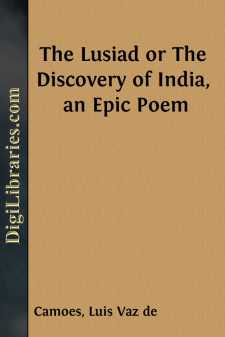Categories
- Antiques & Collectibles 13
- Architecture 36
- Art 48
- Bibles 22
- Biography & Autobiography 813
- Body, Mind & Spirit 142
- Business & Economics 28
- Children's Books 16
- Children's Fiction 13
- Computers 4
- Cooking 94
- Crafts & Hobbies 4
- Drama 346
- Education 46
- Family & Relationships 57
- Fiction 11829
- Games 19
- Gardening 17
- Health & Fitness 34
- History 1377
- House & Home 1
- Humor 147
- Juvenile Fiction 1873
- Juvenile Nonfiction 202
- Language Arts & Disciplines 88
- Law 16
- Literary Collections 686
- Literary Criticism 179
- Mathematics 13
- Medical 41
- Music 40
- Nature 179
- Non-Classifiable 1768
- Performing Arts 7
- Periodicals 1453
- Philosophy 64
- Photography 2
- Poetry 896
- Political Science 203
- Psychology 42
- Reference 154
- Religion 513
- Science 126
- Self-Help 84
- Social Science 81
- Sports & Recreation 34
- Study Aids 3
- Technology & Engineering 59
- Transportation 23
- Travel 463
- True Crime 29
The Lusiad or The Discovery of India, an Epic Poem
Description:
Excerpt
In undertaking, at the publishers' request, the function of editor of Mickle's Lusiad, I have compared the translation with the original, and, in some places, where another translation seemed preferable to, or more literal than, Mickle's, I have, in addition, given that rendering in a foot-note. Moreover, I have supplied the arguments to the several cantos, given a few more explanatory notes, and added a table of contents.
"The late ingenious translator of the Lusiad," says Lord Strangford, "has portrayed the character, and narrated the misfortunes of our poet, in a manner more honourable to his feelings as a man than to his accuracy in point of biographical detail. It is with diffidence that the present writer essays to correct his errors; but, as the real circumstances of the life of Camoëns are mostly to be found in his own minor compositions, with which Mr. Mickle was unacquainted, he trusts that certain information will atone for his presumption."
As Lord Strangford professes to have better and more recent sources of information regarding the illustrious, but{viii} unfortunate, bard of Portugal, I make no apology for presenting to the reader an abstract of his lordship's memoir. Much further information will be found, however, in an able article contained in No. 53 of the Quarterly Review for July, 1822, from the pen, I believe, of the poet Southey. "The family of Camoëns was illustrious," says Lord Strangford, "and originally Spanish. They were long settled at Cadmon, a castle in Galicia, from which they probably derived their patronymic appellation. However, there are some who maintain that their name alluded to a certain wonderful bird, whose mischievous sagacity discovered and punished the smallest deviation from conjugal fidelity. A lady of the house of Cadmon, whose conduct had been rather indiscreet, demanded to be tried by this extraordinary judge. Her innocence was proved, and, in gratitude to the being who had restored him to matrimonial felicity, the contented husband adopted his name." It would appear that in a dispute between the families of Cadmon and De Castera, a cavalier of the latter family was slain. This happened in the fourteenth century. A long train of persecution followed, to escape which, Ruy de Camoëns, having embraced the cause of Ferdinand, removed with his family into Portugal, about A.D. 1370. His son, Vasco de Camoëns, was highly distinguished by royal favour, and had the honour of being the ancestor of our poet, who descended from him in the fourth generation. Luia de Camoëns, the author of the Lusiad, was born at Lisbon about A.D. 1524. His misfortunes began with his birth—he never saw a father's smile—for Simon Vasco de Camoëns perished by shipwreck in the very year which{ix} gave being to his illustrious son. The future poet was sent to the university of Coimbra—then at the height of its fame,—"and maintained there by the provident care of his surviving parent."
"Love," says Lord Strangford, "is very nearly allied to devotion, and it was in the exercise of the latter, that Camoëns was introduced to the knowledge of the former. In the Church of Christ's Wounds at Lisbon, on 11th April, 1542, Camoëns first beheld Doña Caterina de Atayde, the object of his purest and earliest attachment ... and it was not long before Camoëns enjoyed an opportunity of declaring his affection, with all the romantic ardour of eighteen and of a poet." The peculiar situation of the lady, as one of the maids of honour to the queen, imposed a restraint upon her admirer which soon became intolerable; and he, for having violated the sanctity of the royal precincts, was in consequence banished from the court....


